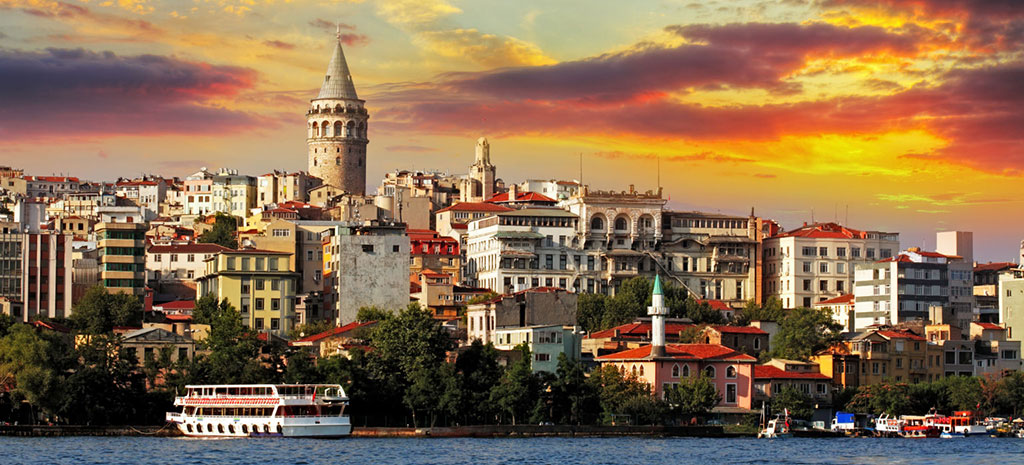
Study in Turkey
Last edited on 04 Mar 2026
Welcome to Turkey!
Turkey is already a firmly established tourist destination, with nearly 40 million tourists visiting from all over the world in 2015 according to Invest in Turkey, making it the sixth most popular holiday destination. Aside from the number of tourist coming to Turkey, the number of international students choosing to study in Turkey has more than doubled since 2006, signaling the country’s growing importance as a higher education destination. In the 2015-16 academic year, there were around 48,000 foreign students in Turkey. Motivations for study in Turkey include the opportunity to gain a relatively inexpensive and good quality education, with opportunities for scholarships that also pay a monthly allowance, covering accommodation and tuition fees, health insurance and travel expenses. The Turkish government is keen to extend this popularity into the international student market, with a target of 100,000 international students by 2018.
Higher Education System
Turkish education system is under the supervision and control of the state, namely the Ministry of National Education. According to the Constitution of the Republic of Turkey, everyone has the right to receive education. Education is compulsory from ages 6 to 14 and free in state schools. The country's primary schools currently have a 98 percent participation rate.
The academic year in Turkish education institutions generally begins in the mid-September or early October and continues to May or early June. There is also a two-week winter break in February.
Types of Higher Education Institutions
State Universities (Devlet Universiteleri): The university system in Turkey is governed by the Higher Educational Council (YOK). Turkey has 104 state and 62 private universities (a total of 166 institutions of higher learning), 5 of which are located in the Turkish Republic of Northern Cyprus. Apart from the public and private universities, 8 foundation higher vocational schools serve the job market.
Generally, undergraduate education takes 4 years at universities, but some fields such as medicine (6 years), dentistry (5 years), and veterinary science (5 years) take longer. Turkish high school graduates go directly into fields of study such as medicine, law, dentistry and so on. No tuition fee is charged at public schools (devlet universitesi); students pay only a small basic fee. Students need to pass a nationwide University Entrance Exam (OSS) to enter a university. The graduates of 4-year programs are awarded with the Bachelor’s Degree (Lisans Diplomasi).
The medium of instruction at some state universities is English, German or French. Therefore, all correspondence with the university staff and applications to the faculties can be done in English, German or French. However, instruction language at state universities is mostly Turkish. When entering the exam of the university, the knowledge of Turkish is not necessary. Those who pass the exams, and have only a little knowledge of Turkish, are considered to take one year of language foundation to gain proficiency in the Turkish language.
Graduate-level programs consist of master and doctoral programs, coordinated by institutes in universities. Medical specialty programs are carried out within the faculties of medicine and the training hospitals owned by the Ministry of Health and the Social Security Institute (SGK).
Higher Vocational Schools (Meslek Yuksek Okulları): They offer 2 years of undergraduate study after high school and are very much like the community colleges in the USA. The only difference is that students cannot easily transfer to 4-year schools in the USA due to fewer places at the 4-year schools. Two year graduates must take the national Vertical Transfer Test (Dikey Gecis Sinavi) and have a high GPA to be able to apply to 4-year schools. The graduates of 2-year programs are awarded with the Associate’s or Pre-Bachelor’s Degree (On Lisans Diplomasi).
Private or Foundation Universities (Ozel / Vakif Universiteleri): In Turkey, private foundations obtained the right in 1984 to establish and develop universities. They were established with the fundamental aim of creating a centre of excellence in higher education and research. Private universities take more active initiatives to form and to select international and global educational and research networks.
The medium of instruction in most private universities is English. Almost all have one year of English study for those whose level of English is not found to be proficient upon entrance.
Private universities charge tuition fee ranging from USD 6,000-20,000. Although private institutions, they offer considerable financial aid; more than 40% of all students receive some sort of financial aid.
Student Cities in Turkey
Istanbul
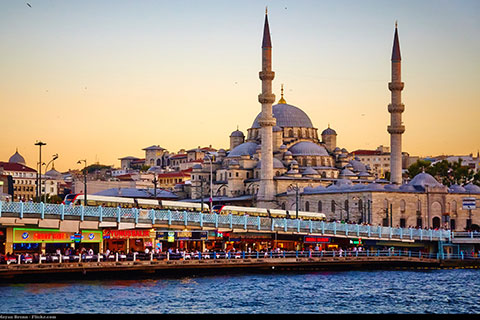
Istanbul is Turkey’s largest city and has a history going back thousands of years, but is today flourishing as a global city with a constantly growing skyline. Home to over 14 million people, Istanbul welcomed approximately 12.5 million tourists in 2015, five years after it was named a European Capital of Culture, making the city the world's fourth-most-popular tourist destination. The cultural heritage of the city is a big appeal for tourists, and also the clubs, pubs and Turkish taverns.
Bogaziçi Üniversitesi and Sabanci University are two of Istanbul's highest ranked universities at 9th and 13th place in the EECA rankings respectively. Koç University and Istanbul Technical University are 16th and 23rd, while Istanbul University also ranks highly at 34th place.
Ankara
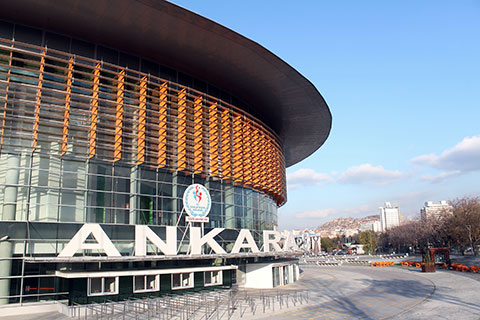
Ankara is Turkey’s capital and second largest city. A busy commercial and political center, it has a large student population, as well as a significant community of international diplomats. Its most popular visitor attractions include Ankara Castle, the Museum of Anatolian Civilizations, and Anıtkabir, the mausoleum of Mustafa Kemal Atatürk, founder of the Republic of Turkey. Ankara is also a popular destination for bird-watching.
The two highest ranked universities in Ankara are Bilkent University and Middle East Technical University (METU), ranked 12th and 14th respectively in the EECA rankings. Another highly ranked university in Ankara is Hacettepe University, which is 40th in the EECA rankings. Other universities in Ankara include Gazi University, ranked 85th, the Turkish Military Academy, and Baskent University.
İzmir
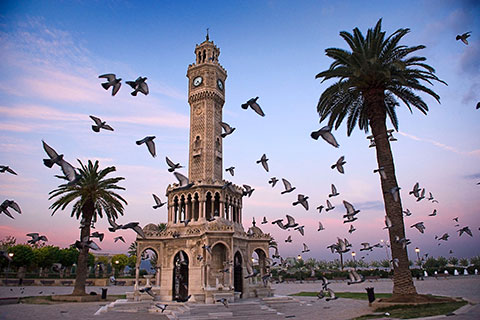
The third largest city in Turkey, İzmir is known as the ‘Pearl of the Aegean’ for its picturesque location overlooking the Aegean Sea. İzmir has a liberal, laid-back feel, although the Kemeraltı market, beaches and many events and exhibitions the city hosts mean you’re unlikely to be bored here. It has a vast and multicultural history of around 4000 years, and is home to Ege University, ranked 72nd in the EECA rankings, and Dokuz Eylül University, which is joint 92nd. It is also home to several young universities - Yasar University, founded in 2001 and an English-medium university, the University of İzmir, founded in 2007, and Katip Çelebi University and Şifa University, both founded in 2010.
Adana
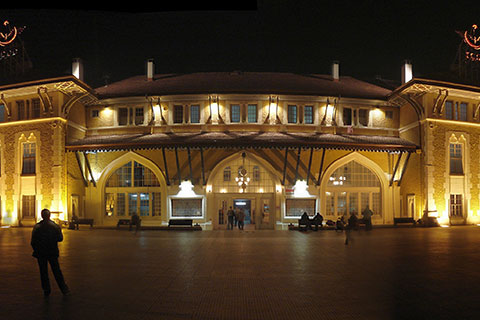
Another student city is Adana, the fifth most populous city in Turkey and home to Cukurova University, ranked 111-120 in the EECA rankings. Apart from its ranking, the university’s location in southern Turkey makes it highly attractive. On the east coast of the Seyhan Dam Reservoir Lake, its facilities include dining halls amongst the pine trees. Adana is another very old city which dates back to 6000 B.C, so there is plenty of culture to enjoy here.
Other top student cities in Turkey
Other top universities in Turkey include Anadolu University in Eskişehir, one of Turkey’s more affordable big cities, whose name literally means ‘old city’ in Turkish. Courses are taught in Turkish, English, French and German. Another is Süleyman Demirel University, Isparta, which is one of Turkey’s largest universities in terms of student numbers, and is also part of the Erasmus Program for exchange students.
Finally, Akdeniz University in Antalya is actively encouraging international student participation, through programs such as the Mevlana Exchange Program, the Bologna Process and the International Association for the Exchange of the Students for Technical Experience.
In most of these locations, many local people can speak English, making it relatively easy for international students to settle in, even without fluency in Turkish. All in all, studying and living in Turkey promises to provide an experience unlike any other – as you’ll discover if you choose this truly ‘Eurasian’ destination for your university years.
Application, Fees and Visas in Turkey
Tuition fees in Turkey tuition fees in Turkey
Tuition fees for international students are fairly affordable and vary depending on the program. Public universities are much cheaper than private institutions in Turkey, as a postgraduate degree at a public university could cost you as little as US$300-800 for a postgraduate qualification. Private universities set their own fees and charge up to $20,000.
At public universities, tuition fees are generally more expensive for study programs in English, ranging from $600-1500 per year, while the same courses in Turkish are around $240-750.
Cost of living
The cost of living is relatively low compared to other study destinations in Europe, with $400 to $500 estimated to be needed per month to cover living costs including accommodation, although this will depend on your lifestyle and spending habits. You will also need around $100 to $150 per semester to cover the costs of course books and administrative fees.
Turkish student visa requirements Applying to study in Turkey
In order to study in Turkey, you'll first need to be accepted onto a course at a Turkish university, and then apply for a student visa at your nearest Turkish consulate. In order to be granted a Turkish student visa, you will need:
- A copy of your letter of acceptance from a Turkish university
- A completed Turkish student visa application form (obtained from the consulate)
- A valid passport, with an expiry date beyond the end of your planned stay in Turkey
- A processing fee, which varies depending on your nationality
- Passport-sized photographs of yourself
It generally takes around eight weeks from the time you submit your application until you receive your visa. After arriving in Turkey, you should also apply for a residence permit, within one month of arrival. This can be done at the nearest police headquarters, and requires you to show proof that you are enrolled at a Turkish university, your passport and Turkish student visa, photographs and a fee.
International students in Turkey are permitted to work for up to 24 hours per week.
Fast fact
- Capital is Ankara, but largest city is Istanbul
- Official language is Turkish; also spoken are Kurdish, Arabic, Armenian and Greek
- Main religion is Islam
- Population is around 78 million
- Currency is the Turkish lira
- International dialling code is +90 and internet domain is .tr
- Borders with eight countries: Bulgaria, Greece, Georgia, Armenia, Iran, Iraq, Syria and Azerbaijani exclave Nakhchivan
- About 5% of landmass on the European continent, 95% in Asia
- Major industrial sectors include petrol, steel, mining, vehicle manufacture, textiles and food production
- Traditional Turkish cuisine is probably best known for kebab (meat cooked on a skewer), meze (assorted small dishes), and baklava (very sweet filo pastry-based dessert)





